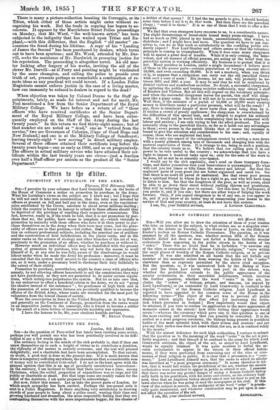• tettro to qt ittitor.
PROMOTION BY PIIRCIIA.SE IN THE ARMY.
Florence, 27th February 1855. Sin—I perceive by your columns that Lord Goderich has on the books of the House of Commons a notice on promotion by purchase in the Army. What his Lordship's views on the subject are I know not ; but I hope that he will not omit to take into consideration, that the total sum invested by officers at present on full and half pay in the Army, even at the regulation- price established by the Crown, amounts to about seven millions sterling ; which the country is bound in honour to refund to those officers should they be deprived of the privilege of reselling their respective commissions. The fact, however, really is, if the truth be told, that it is not promotion by pur- chase that we, the .public, have cause to complain of,—which virtually is promotion by seniority with those officers who have it in their power to pur- chase themselves on in the Army when their turn may come, and the gene- rality of officers are in that position,—but rather, that there is no examina- tion on ordinary professional subjects, including the practical use of artillery and the construction of field fortifications in the junior ranks, and in the senior ranks on the science of strategy and other branches of the art of war, previously to the promotion of an officer, whether by purchase or without it:
However much an individual officer may be dissatisfied with the present system of promotion by purchase, who may not have the means to avail himself of it, at any rate he was fullLaware of the disadvantage he would labour under when he made the Army his profession : moreover, it must be conceded that the system itself secures to the country a class of officers who are, as it were, under a pecuniary bond to discharge their duty faithfully to the extent of their ability. Promotion by purchase, nevertheless, might be done away with gradually; namely, by not allowing officers henceforth to sell the commissions they may not have purchased, as they now are permitted to do under certain regula- tions, which indulgence perpetuates the system. But let us take care that, in our endeavour to effect a beneficial reform in the Army, we do not "grasp the shadow instead of the substance" ; for gentlemen of high birth and in the possession of some private fortune are peculiarly qualified to become the officers of the British Army, whose ranks are recruited for the most part by volunteers from the lowest classes of society.
Were the conscription in force in the United Kingdom, as it is in Franca and generally on the Continent of Europe, promotion from the ranks would be an imperative justice to the conscript, who is forced to become a soldier by the result of a state lottery of inconceivable hardship and oppression.
I have the honour to be, Sir, your obedient humble servant,
W. BRYAN Cooxx.


























 Previous page
Previous page